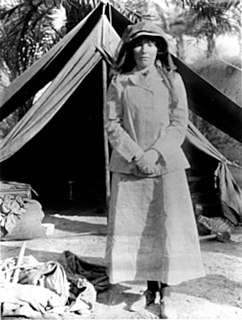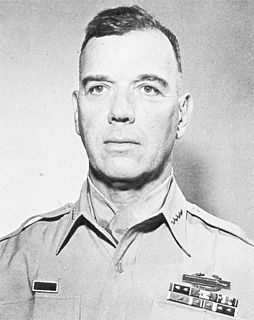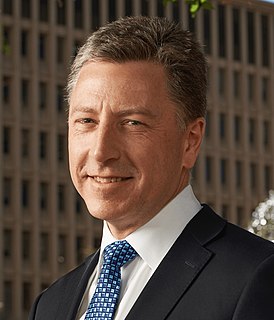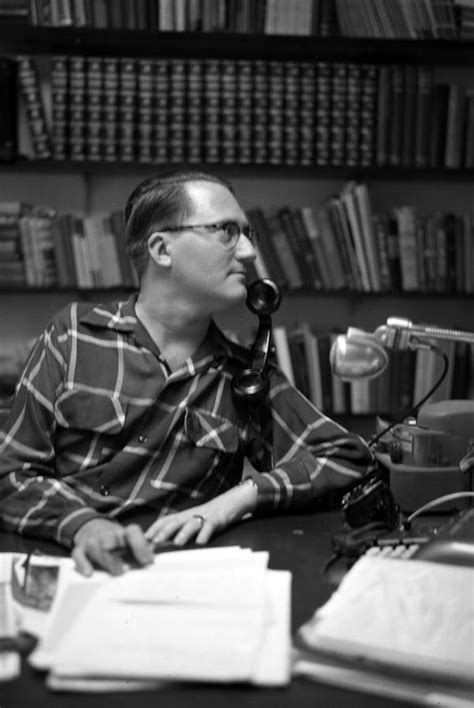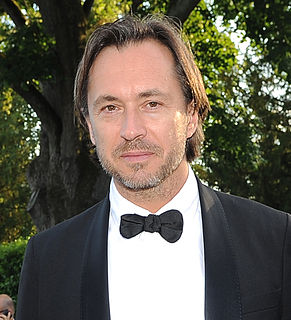A Quote by Gertrude Bell
I've been busy with a long memorandum about the whole of our central Arabian relations, which I've just finished. It will now go to all the High and Mighty in every part. One can't do much more than sit and record if one is of my sex, devil take it; one can get the things recorded in the right way and that means, I hope, that unconsciously people will judge events as you think they ought to be judged. But it's small change for doing things, very small change I feel at times.
Quote Topics
Related Quotes
We must not drift away from the humble works, because these are the works nobody will do. It is never too small. We are so small we look at things in a small way. But God, being Almighty, sees everything great. Therefore, even if you write a letter for a blind man or you just go sit and listen, or you take the mail for him, or you visit somebody or bring a flower to somebody-small things-or wash clothes for somebody, or clean the house. Very humble work, that is where you and I must be. For there are many people who can do big things. But there are very few people who will do the small things.
You can do things in every part of the world. You can do things in every discipline. You can do large things, you can do small things. But it takes a while to figure out what you actually want to do. And it changes. As you change your interests and desires in philanthropy change, I think you have to be open to that change.
You know, small children take it as a matter of course that things will change every day and grown-ups understand that things change sooner or later and their job is to keep them from changing as long as possible. It’s only kids in high school who are convinced they’re never going to change. There’s always going to be a pep rally and there’s always going to be a spectator bus, somewhere out there in their future.
The way I think of it is that Russia is not going to change fundamentally. They may change tactics; they may look at their interests and figure out what actions they take, but they're not going to change fundamentally. And they're going to try to gauge what will the responses be to things that they do, and what will our things be. And here, they do wonder what is the level of our resolve? How far are we willing to go? And that is something that is very hard to gauge.
I think culture is where things change in us deeply. But right now, I think that people are very traumatised. They are very scared. Having grown up in a house with a perpetrator who was violent every day and terrorising every day, I feel like that this country is suddenly very much like the house and the family I grew up in. Every day we are glued to our phones, glued to our television; "What is this psychopath going to do next? How will he embarrass us? Who will he bully or hurt or humiliate today? It's so easy to get locked into a syndrome where the perpetrator is ruling your life.
We get angry about the small things sometimes, I feel, so that we feel like we're doing something, so that we don't have to tackle the big things. And it's fine; let people do that. But I'm not gonna now change because of that. You know? Like, the worst thing that happens to me is you don't like me. And then what?
There is nothing that you can do to change the present moment. It simply is. You may be able to change the situation one second, one minute, one hour, or one day from now, but there's absolutely nothing you can do to change the way things are right here and now. By not getting irritated you will be more effective in doing what needs to be done to change the situation for the next moment.
Prayer is not a way to get what we want to happen, like the remote control that comes with the television set. I think that prayer may be less about asking for the things we are attached to than it is about relinquishing our attachments in some way. It can take us beyond fear, which is an attachment, and beyond hope, which is another form of attachment. It can help us remember the nature of the world and the nature of life, not on an intellectual level but in a deep and experiential way. When we pray, we don't change the world, we change ourselves. We change our consciousness.
If we stop believing in a future, if we stop doing things for something else but start doing them for now, some fundamental things change. Retirement becomes less about how much money you can squirrel away now and much more a matter of participating and contributing to your own community now so that they want to take care of you. … We’re going to move into a world where your retirement will be more secure if you’ve made lots of friends with young people rather than collected lots of dollars.
I hesitate talking about a program for change because we're in this moment where no one is listening to sex workers about how things should change. So I'm even speaking less as a former sex worker and more as a person trying to see the bigger picture that might be hard to see when you're doing sex work full-time, or running a social service organization, or doing all the things that a lot of sex worker activists are doing. It's hard work, and they don't necessarily get the time to step back and see the whole picture.
Studing jewelry gives you an incredible technical background. If you can work on very, very small things, then, I think, typically you find it easier to go bigger rather than the other way around. I think a lot of architects have struggled with small things. Whereas if you start small, it's easier to get bigger.
Interruptions: The average worker gets interrupted five times each hour. It takes an average of 5 minutes to handle each interruption and 1 minute to get back to what you were doing. This adds up to 30 minutes each hour or 50% of your time!!
You've got to think about "big things" while you're doing small things, so that all the small things go in the right direction.
